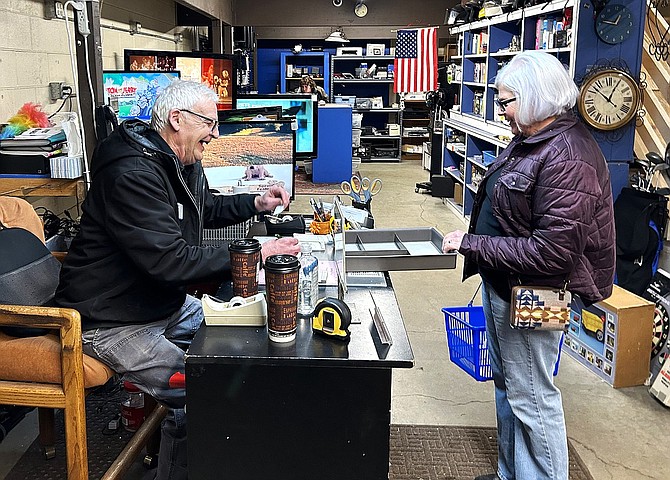Nonprofits not all business

Del Simchuk laughs as he prices an item for Tawny Mitchell at St. Vincent de Paul.
COEUR d’ALENE — Operating a nonprofit isn’t always rewarding.
It’s full of daily challenges, occasional heartache and even disappointments. But leaders of these organizations tend to be passionate about their tasks, so giving up isn’t in their vocabulary.
The North Idaho Business Journal recently asked some nonprofits to share their thoughts on the keys to succeed today. Here’s what they said.
Larry Riley, executive director of St. Vincent de Paul, said one significant task is keeping up with capital investments. For instance, they need a new forklift and need to reroof the Help Center on Harrison Avenue.
“At $180,000 it’s not cheap, yet those $9 jeans or $5 shirts at the thrift help us get there, yet not alone," Riley said.
That’s where grants come in. Whether government block grants or public and private sector grants.
“I can say this without any reservation. Nobody does what St. Vinny’s does in our neck of the woods," Riley said. "I’ve had senior elected officials, law enforcement and others who get it and say, ‘I don’t know what our area would be like without you guys.'"
He said St. Vincent’s is supported by donors, "awesome" thrift shoppers, and understanding government officials. Still, Riley said they face hard choices on the best way to use limited funds.
“As time goes on, more gets added to our plate because we’re a growing county and there’s nowhere else to go,” Riley said. “So, do we add another thing to the plate? Do 100 things 60% well or 60 things 100% well? It’s a tough call to make, especially when lives are at stake. We face life and death decisions all the time, especially in the winter.”
Riley said inflation, keeping good employees and money for marketing remain just a few the other considerations.
“So, pick your battles and do the many things you do really well,” he said.
Paige Olsen, executive director of the Silver Valley Economic Development, said running a successful nonprofit requires strong and passionate leadership, financial stability, transparency, and effective/meaningful programs.
“Because of the challenges of financial constraints, having a clear mission and vision are key so funders know what they are supporting,” she said.
Some of the challenges the SVED has faced are competition for funding, "staffing" issues/capacity, and community engagement.
“Being in an underserved area does give Shoshone County a leg up on the competition in some aspects, but also because we are rural, the community engagement and outside support can fall short,” Olsen said. “Sustainability is always a key focus and worry with any new program or initiative.”
Over the past couple of years there has been a focus on diversity and equity, specifically in grant applications, which has been great to see, Olson said. On the downside she has also seen shifts in donor behavior, who are feeling the strain from the economy.
“As nonprofits, we rely on local memberships and donations as well, so this has been another hurdle to have to jump over,” Olson said.
She has seen success by staying adaptable, innovative, and committed to the initiative. Olson said she is continually growing her networking outreach and engaging with the community to see what programs are important to them.
The Better Together Animal Alliance in Ponderay said a significant challenge they face is the escalating costs of core operations. Expenses for essential items like food, veterinary/medical supplies, utilities and insurance have all increased.
“This surge in costs places a strain on our budget, requiring us to constantly seek innovative solutions and efficient resource management,” BTAA officials wrote in a prepared statement.
Similar to many organizations, it is feeling the impact of staffing shortages. Nonprofits face the added challenge of competing for talent while striving to maintain competitive wages.
“Our region specifically is lacking in affordable housing, which has driven much of our workforce from the area as they look for either higher wages, or lower cost of living. In addition, our programs are designed to help people when they need it most and fill gaps in our community resources," BTAA officials said. "During difficult financial times, the burden is greater on a nonprofit to meet the community's needs."
BTAA has identified key strategies that contribute to its success. Proactive community engagement, innovative fundraising initiatives and collaboration with local businesses and volunteers are essential components of their approach.
"Additionally, emphasizing the unique stories of our animals and the impact of our work has proven effective in attracting support and building lasting connections with donors," BTAA officials said.
Running a nonprofit in today's environment requires adaptability, creativity, and community support, BTAA added.
“We remain committed to serving our community pets and their families and are confident that with continued collaboration and support, we can overcome these challenges and make a lasting impact on the well-being of the animals in our care," BTAA officials said.
Friends of the Restorium provides recreational opportunities and support for residents at Boundary County Community Restorium, a county-owned assisted living home in Bonners Ferry.
It has raised more than $500,000 since it started about 20 years ago. Friends of the Restorium has spent nearly $50,000 for generators, $27,000 for a 12-passenger van and $38,000 for furniture,.
Donna Jo Dirks, a longtime volunteer, said the nonprofit's $5 annual membership has never changed and likely never will. At one point it had about 500 members
Dirks said it has faced operational challenges as their core group is shrunk. Volunteers have retired, others have taken jobs and newcomers aren't as wild about volunteering.
“It really dwindled down,” she said. "Recruitment is difficult."
But no one is giving up.
“I feel an obligation to the community because we promised the older people of the community we would take care of them," she said.
She said Restorium residents are happy as the staff is friendly and accommodating.
“It is the community that does this,” Dirks said.
 A dog at Better Together Animal Alliance is all smiles.
A dog at Better Together Animal Alliance is all smiles.










